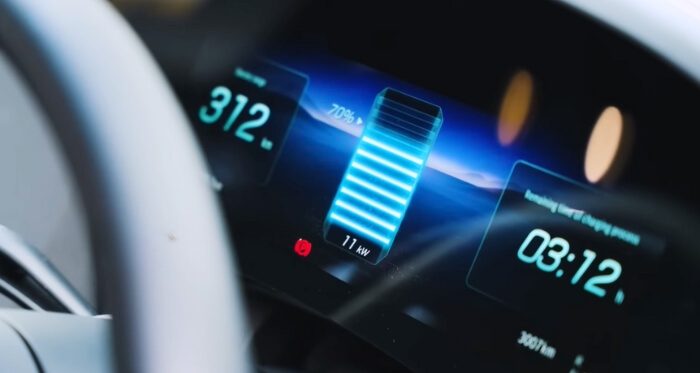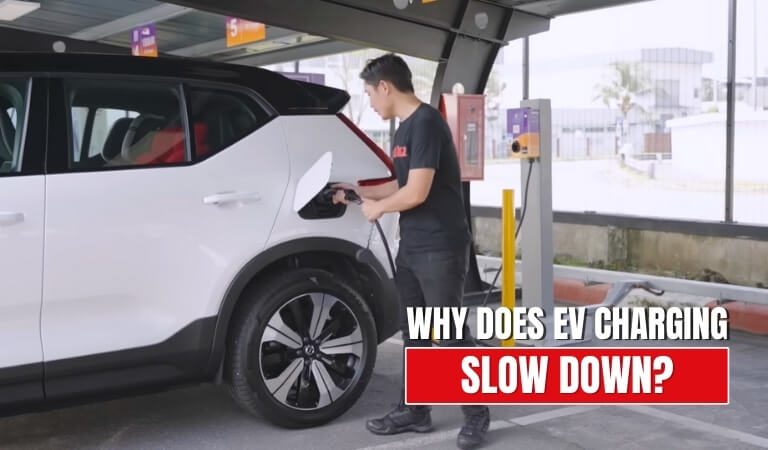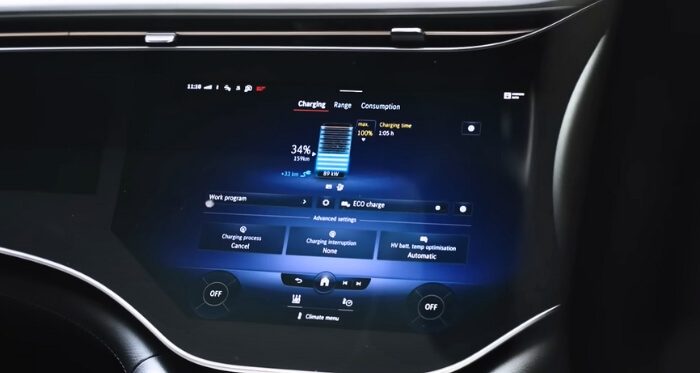As electric vehicles continue to gain extensive adoption, the efficiency of the charging process becomes a critical factor in ensuring a stable and convenient driving experience. “Why Does EV Charging Slow Down?” has become a prevalent question as the demand for electric vehicles rises.
Various factors contribute to the slowdown in electric vehicle charging, such as Battery State of Charge, Temperature Effects, Charging Infrastructure, and Battery technology. Multiple elements contribute to the variation in charging speeds, from the type of charging infrastructure to the state of the vehicle’s battery.
However, by examining the factors, an EV user can gain insights into the mechanisms behind the slowdown and explore potential solutions and advancements. A more easy way to get rid of the charging slowdown issue is to get a reliable charging service provider like CrackPlatoon, the top EV Charger Supplier in Bangladesh.
Do All EV Charging Take Same Time?
A wide range of EV brands are out there, and in most cases, all the brands design their cars with specific details. The different design infrastructures had several impacts on all EVs, for which the charging time differs.

The duration it takes to charge an electric vehicle can vary significantly based on many factors. One crucial factor is the type of charging station used, as there are different charging levels available for EVs. The other factors that can influence the variability in EV charging times are battery SOC and ambient temperature.
However, manufacturers are now integrating high technology and equipment to reduce overall charging times, making electric vehicles even more convenient and practical for daily use.
Types of Electric Vehicle Charging
Electric vehicle charging is categorized into different levels, each offering varying charging speeds and compatibility with different charging infrastructures. Understanding these levels is crucial for EV users to optimize their charging experience.
Level 1 Charging
The most basic and widely accessible form of charging is Level 1 charging. It utilizes a standard household electrical outlet, typically 120 volts in North America. Level 1 is considered to be the slowest charging method and is suitable for overnight charging at home. Even though it is convenient, it will not be practical for quick top-ups during the day.
Level 2 Charging
The second EV charging form is Level 2 charging, which requires a dedicated charging station and operates at a higher voltage, usually 240 volts. Its charging speed is significantly faster compared to Level 1.
Moreover, Level 2 charging stations are commonly found in public spaces, workplaces, and residential areas. Many electric vehicles are equipped with onboard chargers compatible with this charging method.
DC Fast Charging (Level 3)
The final and level 3 charging form of an EV is DC charging. These high-powered charging stations use direct current and can provide a substantial charge in a short amount of time.
Commonly, DC chargers are found along highways and in areas where quick charging is essential. During long trips, EV users can minimize battery downtime by quickly charging through a DC station.
Charging Times for Each Level of EV Charger
The explanation below demonstrates clear ideas of how much time each EV Charger consumes while charging the EV:
Level 1 Charging Times
Firstly, level 1 charging is known for its slower charging pace. On average, it adds around 2 to 5 miles of range per hour of charging, making it suitable for overnight charging scenarios where ample time is available.
Level 2 Charging Times
Level 2 charging is notably faster than Level 1. Charging times for Level 2 stations vary, but they typically add around 10 to 60 miles of range per hour, depending on the vehicle’s onboard charger capacity and the charging station’s power output.
DC Fast Charging Times
Lastly, DC fast charging is designed for rapid charging on the go. Charging times are significantly shorter at this charging station, providing approximately 60 to 80 miles of range in just 20–30 minutes. Frequent fast charging is of
However, the charging period also depends on the specific vehicle and charging station capabilities. This charging process is ideal for long-distance travel and quick pit stops.
Why Does EV Charging Slow Down?
Different types of EVs have different charging capacities based on the manufacturer. However, the recharging process is similar for all the EVs. Some technical factors are responsible when slow charging is detected in a vehicle. Check out the factors below to identify why EV Charging is Slow Down.

Battery State of Charge (SOC)
The charging speed of electric vehicles is intricately linked to the Battery State of Charge (SOC), which represents the amount of energy stored in the battery. Charging tends to be faster when the battery has a lower SOC, as there is more room to accommodate incoming charges.
Conversely, when the battery approaches a higher SOC, the charging rate may slow down to prevent overheating and ensure the longevity of the battery. Almost every EV battery is designed to charge faster, from empty to 80%, and then become slow to reach the maximum.
Slow charging after 80% is not a defect or problem in the EV, but it is a technical mechanism to keep the battery at an appropriate thermal stage. Moreover, maximum EV manufacturer advise to not charge a EV car to 100%, as it cause degradation to the battery over time.
Temperature Effects
Another impactful factor is the temperature, which significantly influences the capability of the charging process. Extreme temperatures, whether hot or cold, can impact the chemical reactions occurring within the battery, affecting its ability to accept a charge.
Charging an EV in colder climates might be slower as the battery’s chemical reactions slow down, while in hotter climates, there may be concerns about overheating, leading to adaptive charging strategies to maintain optimal temperatures.
Charging Infrastructure
The availability and compatibility of charging infrastructure play a crucial role in determining charging speed. The power capacity of the charging station, measured in kilowatts (kW), directly affects how quickly an electric vehicle can recharge.
Higher-powered charging stations, such as Level 3 DC fast chargers, offer faster charging rates compared to standard Level 2 chargers, enabling quicker top-ups during short breaks or long-distance journeys.
Hardware Issues and Software upgrades
Charging speed in electric vehicles is primarily impacted by the hardware, such as the battery capacity and the charging infrastructure. Sometimes software upgrades can optimize various aspects of an EV’s performance, but they typically do not directly impact charging speed in terms of the physical transfer of energy to the battery.
However, software updates can indirectly change charging schedules by improving battery management algorithms. Enhanced algorithms can lead to better temperature control, more accurate state-of-charge calculations, and optimized charging profiles. On the other hand, some updates can lead to slower charging, depending on the manufacturer’s technical basis.
Understanding these factors provides insights into the dynamic nature of EV charging speeds. As technological advancements continue and the charging infrastructure expands, addressing these considerations will be critical to ensuring efficient and accessible charging.
How To Fix the Slow Charging Problem In an EV?
Advancements in technology and strategic solutions offer promising avenues to overcome the charging slowdown factors and enhance the electric vehicle charging experience. Here is how to optimize an EV’s charging slowdown issue:

Smart Charging Solutions
Innovative charging technologies play a key role in optimizing the use of charging resources. These solutions enable EV users to schedule charging during off-peak hours when electricity demand is lower, leveraging lower electricity rates and reducing the strain on the power grid.
By implementing intelligent charging schedules, users can efficiently manage and distribute the demand for electricity, contributing to a more seamless and faster charging process. CrackPlatoon offers top-notch EV Charging Stations in Bangladesh. Its Built-in intelligent monitoring feature provides information on the vehicle’s charging progress, battery health, and voltage insights for easier maintenance.
Advancements in Battery Technology
Manufacturers doing continuous research and development in battery technology hold the key to overcoming charging slowdowns. Innovations aimed at improving energy density, increasing charging efficiency, and enhancing thermal management systems contribute to faster and more reliable charging.
As battery technologies advance, the EV industry anticipates breakthroughs that will positively impact charging times, making electric vehicles even more practical and appealing for consumers.
Expansion of Charging Infrastructure
The expansion and enhancement of charging infrastructure are critical components in addressing charging slowdowns. Governments, in collaboration with industries, are investing in the development of a widespread and accessible charging network.
Increasing the number of charging stations, especially high-speed Level 3 DC fast chargers, ensures that EV users have convenient and efficient charging options, particularly during long-distance travel. To provide a more convenient DC fast charging solution, CrackPlatoon introduces the RUMI71 DC Type EV Charger.
Overcoming the charging slowdown involves a multi-faceted approach, integrating smart charging solutions, advancements in battery technology, and an expansive charging infrastructure. Moreover, picking up a suitable EV Charger Supplier is also essential to getting faster and more reliable charging experiences.
Final Words
As electric vehicles primarily rely on batteries and demand electrical energy for propulsion, challenges such as battery draining, slow charging, and suboptimal output are expected. Keeping in mind every EV’s betterment and the user’s smooth experience, CrackPlatoon offers high-end EV Charging Stations in Bangladesh.
For individuals encountering the difficulty of ‘Why Does EV Charging Slow Down?’, a solution is readily available at CrackPlatoon. Here, users can choose from a selection of top-tier EV chargers. All their charging stations are meticulously designed, incorporating diagnostic and auto-fault detection features. These features guarantee the optimal functioning of an EV by contributing to a reliable and efficient charging experience.
